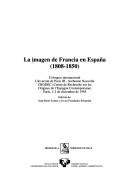| Listing 1 - 2 of 2 |
Sort by
|
Multi
ISBN: 9780521117692 9780511978623 9781107533660 9781139379144 1139379143 9781139376280 1139376284 0511978626 0521117690 110753366X 1316088626 113936524X 1280773537 9786613684301 113937771X 1139374850 1139370863 Year: 2012 Publisher: Cambridge Cambridge University Press
Abstract | Keywords | Export | Availability | Bookmark
 Loading...
Loading...Choose an application
- Reference Manager
- EndNote
- RefWorks (Direct export to RefWorks)
Leading theatre historians and practitioners map a theatrical history that moves from the religious tropes of medieval Iberia to the postmodern practices of twenty-first-century Spain. Considering work across the different languages of Spain, from vernacular Latin to Catalan, Galician and Basque, this history engages with the work of actors and directors, designers and publishers, agents and impresarios, and architects and ensembles, in indicating the ways in which theatre has both commented on and intervened in the major debates and issues of the day. Chapters consider paratheatrical activities and popular performance, such as the comedia de magia and flamenco, alongside the works of Spain's major dramatists, from Lope de Vega to Federico García Lorca. Featuring revealing interviews with actress Nuria Espert, director Lluís Pasqual and playwright Juan Mayorga, it positions Spanish theatre within a paradigm that recognizes its links and intersections with wider European and Latin American practices.
Théâtre --- Théâtre (genre littéraire) espagnol --- Theater --- Spanish drama --- Histoire --- Histoire et critique --- History --- History and criticism --- Théâtre espagnol --- Continental European. --- Théâtre espagnol --- Dramatics --- Histrionics --- Professional theater --- Stage --- Theatre --- Performing arts --- Acting --- Actors --- Spanish literature --- Theatrical science --- Drama --- History and criticism. --- Théâtre --- History. --- Histoire. --- Histoire et critique.


ISBN: 2878541421 2878547608 9782878541427 Year: 2017 Publisher: Paris : Presses Sorbonne Nouvelle,
Abstract | Keywords | Export | Availability | Bookmark
 Loading...
Loading...Choose an application
- Reference Manager
- EndNote
- RefWorks (Direct export to RefWorks)
Fruit d'un colloque international qui s'est tenu à Paris à la fin de 1995 et qui portait sur L'image de la France en Espagne pendant la première moitié du XIXe siècle, cet ouvrage réunit près d'une vingtaine de travaux de spécialistes, qui offrent au lecteur un large éventail de thèmes et de perspectives sur la question, puisqu'ils touchent à la presse, à la littérature, à l'historiographie, à l'art, aux idées politiques et sociales. Les diverses visions que les Espagnols du XIXe siècle ont eues de la nation voisine, marquées, des années durant, par le traumatisant épisode napoléonien, ne sont pas exemptes de contradictions. L'asymétrie des échanges culturels entre les deux pays, leur poids très différent comme puissances sur la scène internationale et, enfin, l'important décalage chronologique entre leurs séquences historiques respectives, constituent autant de motifs de défiance, laquelle, en effet, affleure très souvent du côté espagnol. Rien de tout cela, cependant, n'a empêché de nombreux écrivains et intellectuels espagnols d'essayer d'adapter à la mentalité et aux besoins de leur pays ceux des aspects de l'expérience françaises tenus pour les plus intéressants et profitables, et ce dans les domaines les plus divers. Cette réception partiale et sélective, toujours filtrée par l'arrière-fond culturel hispanique, s'est opérée de telle façon que, à maintes reprises, la France a pu servir simultanément - y compris, parfois, aux yeux d'un même auteur - de modèle et de contre-modèle.
Opinion publique --- Littérature espagnole --- Histoire --- Influence française --- Opinion publique - Espagne - Histoire - 19e siècle - Congres --- Littérature espagnole - Influence française - Congres --- History --- caractère national français --- opinion publique --- Espagne --- relations internationales --- vie intellectuelle --- XIXe siècle --- influence française
| Listing 1 - 2 of 2 |
Sort by
|

 Search
Search Feedback
Feedback About UniCat
About UniCat  Help
Help News
News